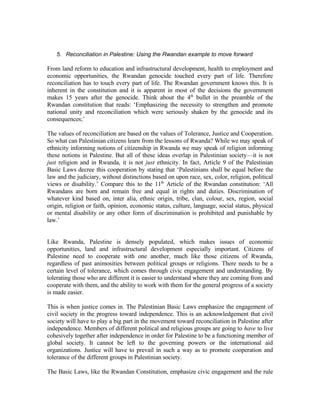
Using Rwanda's Reconciliation Lessons for Palestine
- 1. 5. Reconciliation in Palestine: Using the Rwandan example to move forward From land reform to education and infrastructural development, health to employment and economic opportunities, the Rwandan genocide touched every part of life. Therefore reconciliation has to touch every part of life. The Rwandan government knows this. It is inherent in the constitution and it is apparent in most of the decisions the government makes 15 years after the genocide. Think about the 4th bullet in the preamble of the Rwandan constitution that reads: ‘Emphasizing the necessity to strengthen and promote national unity and reconciliation which were seriously shaken by the genocide and its consequences;’ The values of reconciliation are based on the values of Tolerance, Justice and Cooperation. So what can Palestinian citizens learn from the lessons of Rwanda? While we may speak of ethnicity informing notions of citizenship in Rwanda we may speak of religion informing these notions in Palestine. But all of these ideas overlap in Palestinian society—it is not just religion and in Rwanda, it is not just ethnicity. In fact, Article 9 of the Palestinian Basic Laws decree this cooperation by stating that ‘Palestinians shall be equal before the law and the judiciary, without distinctions based on upon race, sex, color, religion, political views or disability.’ Compare this to the 11th Article of the Rwandan constitution: ‘All Rwandans are born and remain free and equal in rights and duties. Discrimination of whatever kind based on, inter alia, ethnic origin, tribe, clan, colour, sex, region, social origin, religion or faith, opinion, economic status, culture, language, social status, physical or mental disability or any other form of discrimination is prohibited and punishable by law.’ Like Rwanda, Palestine is densely populated, which makes issues of economic opportunities, land and infrastructural development especially important. Citizens of Palestine need to cooperate with one another, much like those citizens of Rwanda, regardless of past animosities between political groups or religions. There needs to be a certain level of tolerance, which comes through civic engagement and understanding. By tolerating those who are different it is easier to understand where they are coming from and cooperate with them, and the ability to work with them for the general progress of a society is made easier. This is when justice comes in. The Palestinian Basic Laws emphasize the engagement of civil society in the progress toward independence. This is an acknowledgement that civil society will have to play a big part in the movement toward reconciliation in Palestine after independence. Members of different political and religious groups are going to have to live cohesively together after independence in order for Palestine to be a functioning member of global society. It cannot be left to the governing powers or the international aid organizations. Justice will have to prevail in such a way as to promote cooperation and tolerance of the different groups in Palestinian society. The Basic Laws, like the Rwandan Constitution, emphasize civic engagement and the rule
- 2. of law. Like Rwanda, the people of Palestine are as responsible to the state as the state is to the people. For it claims in Article 2 that ‘The people are the source of power, which shall be exercised through the legislative, executive and judicial authorities…’ Implicit in this is that it is the citizens right and responsibility to push the governing authorities to act on their behalf. That is, justice will only prevail if there is an active citizenry. Government in both Palestine and Rwanda have limitations due to size, money, regional and internal context, etc. These governments cannot root out every evil of society without the active engagement of the citizens. If the citizens are unsatisfied by their leaders, they may revolt and reconciliation will face a heavy setback. Reconciliation, as we have learned from the Rwandan example, is an ongoing process. It cannot just be a government program, department, or commission—it must be by and for the people. In Rwanda mass atrocity has been cyclical, about every other generation has had some major conflict or battle; the new hope, with the new constitution and the active engagement of the citizenry is that the cycle will now be broken. Palestine, upon independence will have an influx of multi-generational returning refugees and exiles from all over the world—just like Rwanda after the genocide. Like Rwanda, post-conflict, Palestine will have plenty of opportunities and challenges once it reaches independence. The people, across generations, religions and ethnicities, must tolerate and cooperate with one another and they must promote a strong justice system in order to re-enforce reconciliation, so that no one people or group feels they are discriminated or forgotten. Active civic engagement can help achieve the embodiment of all these values. Palestinians take seriously what their politicians do and what happens in their regional context, therefore it is the responsibility of every Palestinian to work together as citizens to promote the democratic principles and values that will keep the Palestinian state united. Story of reconciliation from Kinzer ‘A Thousand Hills’